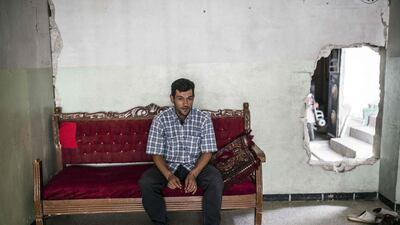Berlin // The father of Alan Kurdi, the three-year-old Syrian refugee boy whose body washed ashore on a Turkish beach a year ago, on Thursday denounced the world’s failure to stop the bloodshed in his home country.
"The politicians said after the deaths in my family: Never again!" Abdullah Kurdi, 41, told Germany's Bild daily.
“Everyone claimed they wanted to do something because of the photo that touched them so much. But what is happening now? People are still dying and nobody is doing anything about it.”
Mr Kurdi was speaking on the eve of the anniversary of the tragedy in the Mediterranean, in which he also lost his wife Rehab, 35, and their other son, five-year-old Galip.
The haunting picture of the toddler’s lifeless body went viral as one of the most searing images of the migrant crisis.
Mr Kurdi, who hails from Syria's Kurdish community, told Bild that it was right for the photo of his son to be published worldwide.
“These things must be shown to make clear to people what is happening,” he said. “But in the end the picture did not change much. The horror in Syria must finally stop.”
Mr Kurdi now lives alone in an apartment in Erbil, the capital of Iraq’s Kurdish north, in a compound guarded by the local authorities’ peshmerga forces.
He has kept his late son's stuffed toys in a cabinet in the living room and he chain-smoked during the interview, said Bild, adding that he broke into tears as he recalled the tragedy.
“Now I’m probably safer than I’ve ever been in my life,” he said. “But for what?”
The Kurdi family was originally from the Syrian Kurdish canton of Kobani that was captured by the extremist group ISIL in late 2014, forcing residents to flee across the border into Turkey, which now hosts nearly three million refugees from Syria’s civil war.
Since last year hundreds of thousands of these refugees have attempted to enter Europe by crossing the Aegean Sea to Greece before travelling overland to wealthier countries. While many succeeded, others were turned back or drowned at sea because of rough weather and unsafe boats used by people smugglers.
Facing a humanitarian and political crisis because of the sheer number of arrivals, the European Union this year reached a deal with Turkey to discourage refugees from crossing into Europe. The number of crossings from Turkey has reduced drastically since the deal was signed in March, but a dispute between Ankara and Brussels over terms threatens the agreement.
On Thursday, European parliament president Martin Schulz and EU migration commissioner Dimitris Avramopoulos held separate talks with Turkish officials after they threatened to suspend the deal if visa restrictions were not lifted for Turkish nationals – a key incentive for Ankara in signing the agreement.
Plans to loosen visa restrictions have run into trouble over Turkey’s refusal to amend its anti-terror laws at a time when it is fighting heightened threats from Kurdish rebels and ISIL. The EU wants Turkey to narrow its definition of terrorism.
“We are not moving forward because the counterterrorism law is not being reformed,” Mr Schulz told a media conference with Turkish prime minister Binali Yildirim. “We agree on many things, but we do differ on certain issues. Visa-free travel can happen after ... the completion of all the criteria, including the anti-terror law.”
Mr Yildirim retorted: “Anti-terror law is the issue that we cannot agree on.”
“We as Turkey have made our stance clear: there will be absolutely no wavering, no stepping back regarding the fight against terrorism,” Mr Yildirim said. “Anti-terror is not just about the safety of the Turkish people but also about Europe’s security.”
Separately, Mr Avramopoulos said that “since March, Turkey has made considerable progress”.
“Let me clear on a very important issue. The European Union remains committed to keep the momentum and dialogue on visa liberalisation. A lot has been achieved during the last months, and we want to further build on these achievements,” he said.
Turkey’s minister for EU affairs, Omer Celik, said Turkey was committed to the framework of the March 18 agreement.
“What we expect is that our allies and friends do what they promised to do,” he said.
* Agence France-Presse and Associated Press

